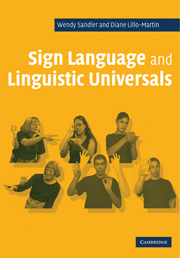1 - One human language or two?
Published online by Cambridge University Press: 05 June 2012
Summary
The study of language over the centuries has yielded a large inventory of concepts and categorizations that are commonly taken for granted. Consonants, vowels, syllables, morphemes, words, phrases, clauses, sentences, and at all levels, rules or constraints are accepted unquestioningly as the nuts and bolts of language. But how fundamental are these properties? In other words, are these and other ubiquitous properties of language genuine universals? That is the question that guides our enterprise.
We are compelled to ask this question by a deceptively simple discovery: natural human languages exist in a physical modality that is different from the one that has been studied for so many centuries – the modality of sign languages used by deaf people all over the world.
That these are natural languages in the same sense as spoken languages seems now to be beyond any doubt (see, among many others, Klima and Bellugi 1979, Wilbur 1979, Poizner, Klima, and Bellugi 1987, Lucas and Valli 1992, Sandler and Lillo-Martin 2001, Emmorey 2002). Sign languages arise spontaneously wherever deaf people have an opportunity to meet regularly. They are acquired by children raised in deaf families without instruction, and along a timetable that is similar to that of hearing children acquiring spoken language (overviews include Newport and Meier 1985, Lillo-Martin 1999a). Sign language appears as effortless and as user-friendly as its spoken counterpart.
Information
- Type
- Chapter
- Information
- Sign Language and Linguistic Universals , pp. 3 - 18Publisher: Cambridge University PressPrint publication year: 2006
